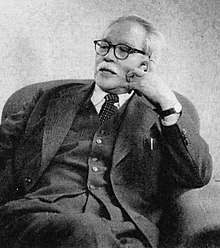Yoshishige Abe
| Yoshishige Abe | |
|---|---|

200px
|
|
| Native name | 安倍 能成 |
| Born |
December 23, 1883 Matsuyama, Ehime, Japan |
| Died | June 7, 1966 (aged 82) Tokyo, Japan |
| Resting place | Tokei-ji, Kamakura, Japan |
| Nationality | Japanese |
| Alma mater | Tokyo Imperial University |
| Occupation | Educator, politician, cabinet minister |
| Awards | Yomiuri Prize (1958) |
Yoshishige Abe (安倍 能成 Abe Yoshishige, 23 December 1883 – 7 June 1966) was a philosopher, educator, and statesman in Shōwa period Japan. As Minister of Education in the immediate post-war era, he oversaw major reforms to the Japanese educational system.
Abe was born in Matsuyama, Ehime Prefecture as the son of a doctor of Chinese medicine. He graduated from Tokyo Imperial University, and was a close associate of Natsume Sōseki, Seiichi Hatano, Kyoshi Takahama and Shigeo Iwanami, although he was forced to return home to teach English in Matsuyama due to reduced family circumstances. He later married the sister of Misao Fujimura. While still a student, he began writing literary criticism and was interested in the development of naturalism.
From 1920, Abe worked as a professor at Hosei University; however, he toured Europe extensively and spent some time at Heidelberg University in 1924 where he studied Kantian philosophy. In 1926 he accepted a position at Keijō Imperial University in Seoul Korea, where he became interested in Korean culture and Korean literature. He travelled to China in 1929, visiting Jinan, Qufu and climbed Mount Tai, and noted the strong Japanese commercial presence throughout Shandong Province. He also visited Manchuria and noted the increasing Chinese presence in Harbin Abe returned to mainland Japan in 1940, returning to his alma mater, the Daiichi High School in Tokyo. However, Abe soon ran afoul of the military authorities with his outspoken criticism of the military’s plans to cut short school curriculums to increase the numbers of conscripts, and of Prime Minister Fumimaro Konoe’s efforts to create a single-party state. Although occasionally harassed by the Kempeitai, he was not arrested.
...
Wikipedia
